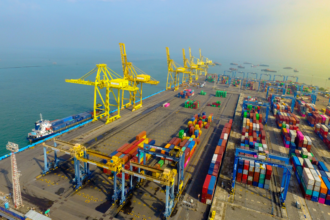In early 2022, residents of the rural Philippine town of Bamban, north of Manila, gathered for the mayoral campaign rally of a young and charismatic woman named Alice Leal Guo. Dressed in pink, her supporters eagerly awaited her arrival. As the thudding of helicopter rotors filled the air, Guo descended from the skies in a grand entrance, waving to the enthusiastic crowd. At just 31 years old, her political star was rising. Promising economic development and subsidies, she quickly captured the hearts of Bamban’s citizens, becoming its first female mayor. However, less than three years later, the Alice Guo scandal would shock the nation, linking her to human trafficking and raising suspicions about her true identity.
How Did Alice Guo Enter Politics?
Guo claimed that she transitioned into politics from a pig-farming business, managing her family’s commercial piggery before launching her mayoral campaign. When questioned about her campaign finances, she insisted that friends and acquaintances in the pig-farming industry had funded her bid. However, investigations later uncovered her connections to wealthy Chinese businesspeople, some of whom have since been convicted of money laundering and human trafficking.
On the campaign trail, Guo exuded an energetic and cheerful persona. “For our team, rule number one is: Do no harm! No harm is allowed, we should just spread love, love, love!” she once proclaimed at a rally. Her bright and youthful energy followed her into office, where she painted the municipal hall pink and adorned it with flowers. She gained a reputation for being empathetic and helpful, arranging jobs and scholarships for locals.
“Alice was beautiful, she was kind, and she was helpful to other women,” said Priscilla May Aban, a 31-year-old vegetable stall owner who had voted for Guo precisely because she was a woman. Many citizens admired her, including Francisco Flores, 75, who emotionally stated, “She helped a lot of poor people here in Bamban, giving medicines and aid. You’d never see a problem with her.”
What Unraveled the Alice Guo Scandal?
A year and a half into her term, however, Guo’s carefully curated image began to collapse. In February 2024, Philippine police received a report about a Vietnamese national who had escaped captivity from Zun Yuan Technology Incorporated, a company operating out of a walled compound in Bamban.
On March 12, police and soldiers prepared to raid the compound located just a short walk from Guo’s municipal office. But shortly before the operation, officers learned that buses were leaving the compound—indicating that their plan had been leaked. Officers rushed to the site and were stunned by what they found: one of the largest scam hubs ever discovered in the Philippines. The compound, spanning 20 acres with 36 buildings, housed an intricate web of illicit operations.
Police found over 300 foreign nationals trapped in forced labor. Among the evidence collected were training scripts detailing how to manipulate victims into fraudulent investments, commonly known as “pig-butchering” scams. This scam involves scammers building trust with victims by pretending to be romantic partners or financial advisors, only to swindle them out of their savings. Enclosed by walls topped with barbed wire, the compound had a self-contained world, complete with dormitories, supermarkets, restaurants, and even a basketball court. Meanwhile, the scam bosses resided in luxury villas with entertainment systems and swimming pools.
What Was Alice Guo’s Role in the Scam Operation?
Investigators soon discovered that the compound was built on land once owned by Guo. More damning evidence surfaced—she had personally granted Zun Yuan a business permit, and her name appeared on an electricity bill found at the site. When confronted, Guo denied any involvement, claiming that she had sold the land before taking office and that the permit approval was just an administrative formality.
Was Alice Guo a Chinese Spy?
As the investigation deepened, another shocking twist emerged in the Alice Guo scandal. When summoned by the Philippine Senate, Guo struggled to answer basic questions about her past. She claimed to have grown up on a family farm but could not remember its location. Her vague and inconsistent statements led Filipinos to mock her online, earning her the nickname “My Amnesia Girl.”
Suspicions grew when her fingerprints matched those of a girl named Guo Hua Ping, a Chinese national who had arrived in the Philippines in the early 2000s with her mother. This revelation led senators to question whether Guo was actually a Chinese spy placed in Philippine politics to gain influence.
Jaye Bekema, a senior officer investigating potential espionage links, stated, “I am more likely to believe that she didn’t plan to be a spy, but that she was tapped to be one because of her criminal connections and influence in local government.”
However, others dismissed the theory. “What can she spy on in a place like Bamban? She’s too visible. A spy wouldn’t flaunt her lifestyle like Alice Guo,” said Teresita Ang See, a leader in the Chinese-Filipino community.
What Were the Political Consequences of the Alice Guo Scandal?
Guo’s case highlighted the dangers of corruption within the Philippine government. Under former President Rodrigo Duterte, Philippine Offshore Gaming Operators (Pogos) flourished, attracting Chinese-run businesses. However, the scandal exposed how criminal syndicates exploited Pogo licenses to operate large-scale scams and human trafficking rings.
Following the raid, President Ferdinand Marcos Jr. banned all Pogos, citing their deep-rooted links to organized crime. Senator Sherwin Gatchalian, who led the investigation, remarked, “Because of this case, there was a groundswell of people clamoring for a ban, and the president officially ended Pogos.”
Despite the crackdown, concerns remain about criminal syndicates infiltrating government institutions. Philippine police continue to raid scam hubs across the country, but allegations persist that some law enforcement officers are protecting these illicit operations.
What Happened to Alice Guo?
In July 2024, despite public scrutiny, Guo managed to evade travel restrictions and fled to Indonesia. However, she was later re-arrested and extradited back to the Philippines, where she now faces six separate cases, including human trafficking. She has pleaded not guilty but remains behind bars.
In Bamban, the once-pink municipal hall has been whitewashed, and the flowers Guo planted have been removed. Yet, some residents still defend her. “We don’t care whether she’s Filipino or not,” said Fortunato Mejia, a local political candidate who once supported Guo. “What’s important is whether she helped us.”
Despite the overwhelming evidence against her, many in Bamban still remember Alice Guo as the mayor who brought development to their town. Whether she was a victim of political maneuvering, a pawn in a larger criminal network, or a willing participant in corruption remains a question that continues to haunt the Philippines.








